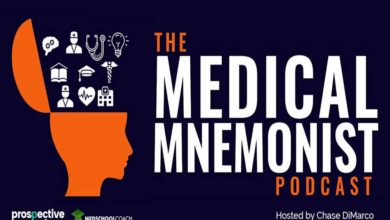Chase DiMarco discusses the six stages of medical learning which you can use to assess your level of knowledge. He also details the best study techniques & methods corresponding to each stage.
- [02:34] Stage 1: Basic Facts & Memorization
- [04:27] Stage 2: Integrative Basics
- [6:07] Stage 3: Integrative Flow
- [7:47] Stage 4: Integrative Clinical
- [12:07] Stage 5: Mixed Pathologies & Stage 6: Fellowship-Level Knowledge
- [12:51] Study Techniques to Use at Each Stage
Stages of Medical Learning
The first stage of medical learning is basic facts and memorization. This stage corresponds to pre-med or to the first few months of medical school. You memorize answers to questions such as ‘what muscle attaches to this bone?’or ‘what cancer marker is seen in pancreatic cancer?’ You do not have the knowledge to synthesize facts or to come up with a treatment plan. At this stage, tools like flashcards are key.
The second stage is integrative basics. You learn the symptoms, signs and treatments for different diseases. This is also where you must memorize ‘illness scripts.’ For example, if a young child comes in tugging their ear and crying, they likely have an ear infection. Integrative basics correspond to the end of your second year of medical school, and are often useful in Step 1 board exams. Whilst flashcards are still useful, you also begin to use question banks (QBs) and develop an awareness of the techniques used by question writers.
Next, integrative flow, which is often relevant for Step 2 board exams. This is where you comprehend the ‘order of operations’ when it comes to treating a patient. Going beyond illness scripts and basic diagnoses, you ask questions like ‘what is the next step of treatment?’ and ‘what diagnostic should I do to confirm my preliminary diagnosis?’ You should still use flashcards and QBs, but should also incorporate more flowcharts and visual tools like mind maps to understand this ‘order of operations.’
The fourth stage is integrative clinical which goes beyond Step 2 board exam materials, and into actual clinical experience. The materials that you study for the board exam often diverge from actual clinical experience, and this is where you delve deeper into treatment options and real patients.
Chase does not focus on the fifth and sixth stages because these go into the realm of residency & fellowship experience. However, all of these stages cultivate your awareness of the constant progression of your knowledge. You should take the time to use rehearsal strategies and you should be wary of ‘recognition memory’ as opposed to true memory.
Sign up for a Free Coaching session with Chase DiMarco, sponsored by Prospective Doctor! You can also join the Med Mnemonist Mastermind FB Group today and learn more about study methods, memory techniques, and MORE!
